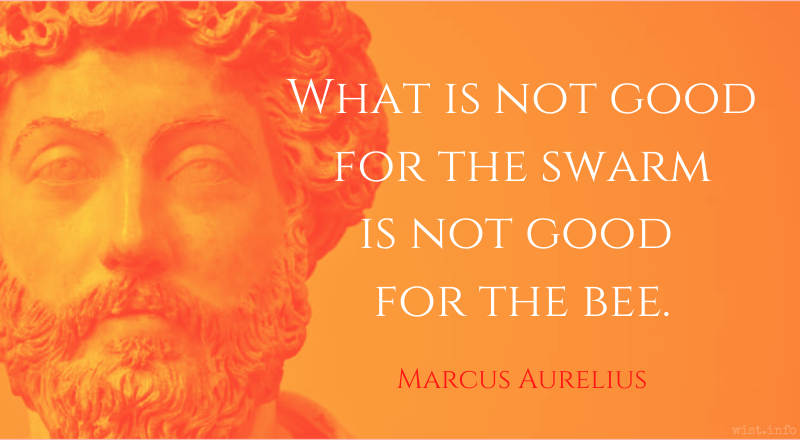Conversation is but carving;
Carve for all, yourself is starving:
Give no more to every Guest,
Than he’s able to digest;
Give him always of the Prime;
And but little at a Time.
Carve to all but just enough:
Let them neither starve nor stuff:
And, that you may have your Due,
Let your Neighbours carve for you.Jonathan Swift (1667-1745) English writer and churchman
“An Epistle to a Lady Who Desired the Author to Write Some Verses Upon Her in the Heroic Style,” ll. 123-132 (1732)
(Source)
Often rendered with the first line ending in an exclamation point, and the second line missing.
Quotations about:
mutuality
Note not all quotations have been tagged, so Search may find additional quotes on this topic.
The time is passed when you could have a happy minority living upon the misery of the great mass. That time is passed. People won’t acquiesce in it, and you will have to learn to put up with the knowledge that your neighbor is also happy, if you want to be happy yourself. I think, if people are wisely educated, they will have a more expansive nature and will find no difficulty in allowing the happiness of others as a necessary condition of their own.
Bertrand Russell (1872-1970) English mathematician and philosopher
Interview by Woodrow Wyatt, BBC TV (1959)
Collected in Bertrand Russell's BBC Interviews (1959) [UK] and Bertrand Russell Speaks His Mind (1960) [US].
They loved their wives, and were beloved by them. Their entire attention was directed to educating their children in the ways of virtue; the miseries of their fellow countrymen were constantly represented to them and held up as the sorriest of examples. Above all, they were taught that individual interest is always bound to the common interest, that to try to separate them was to invite ruin, that virtue is not something costly to achieve nor painful to exercise, and that justice for others is a blessing for ourselves.
They soon had the consolation of virtuous fathers, seeing their children develop in their image.[Ils aimoient leurs femmes, et ils en étoient tendrement chéris. Toute leur attention étoit d’élever leurs enfants à la vertu. Ils leur représentoient sans cesse les malheurs de leurs compatriotes, et leur mettoient devant les yeux cet exemple si touchant ; ils leur faisoient surtout sentir que l’intérêt des particuliers se trouve toujours dans l’intérêt commun ; que vouloir s’en séparer, c’est vouloir se perdre ; que la vertu n’est point une chose qui doive nous coûter ; qu’il ne faut point la regarder comme un exercice pénible ; et que la justice pour autrui est une charité pour nous.
Ils eurent bientôt la consolation des pères vertueux, qui est d’avoir des enfants qui leur ressemblent.]Charles-Lewis de Secondat, Baron de Montesquieu (1689-1755) French political philosopher
Persian Letters [Lettres Persanes], Letter 12, Usbek to Mirza (1721) [tr. Healy (1964)]
(Source)
In the story of the Troglodytes, a tribe who had been decimated by a plague after years of self-interested anarchy where every person did as they wished. The survivors developed a philosophy of mutual aid and community, and prospered.
(Source (French)). Alternate translations:
They lov'd their Wives, and were tenderly belov'd by them. They were wholly intent upon educating their Children to Virtue. They continually represented to them the Calamities of their Countrymen, and often set that moving Example before their Eyes. They above all things instill'd into them this Principle, that every private Man's Interest is inseparable from the Interest of the Community. To divide it, is Ruin. That Virtue is not a thing which should be troublesome to us, nor ought the Exercise of it to give us pain; and that Justice to another, is Charity to our selves.
They had soon the Consolation of virtuous Fathers; which is, to have Children like themselves.
[tr. Ozell (1736)]
They loved their wives, and were affectionately beloved by them. The training up their children to virtue engaged their utmost care. They continually represented to them the miseries of their countrymen, and placed their melancholy example before their eyes. They especially inculcated upon their minds, that the interests of individuals was always to be found in that of the community, and that to attempt to seek it separately was to destroy it; that virtue is by no means a thing that ought to be burdensome to us, nor the practice of it considered as painful; that doing justice to others is acting charitably to ourselves. They soon enjoyed the consolation of virtuous parents, which consists in having children like themselves.
[tr. Floyd (1762)]
They loved their wives, and were beloved most tenderly. Their utmost care was given to the virtuous training of their children. They kept before their young minds the misfortunes of their countrymen, and held them up as a most melancholy example. Above all, they led them to see that the interest of the individual was bound up in that of the community; that to isolate oneself was to court ruin; that the cost of virtue should never be counted, nor the practice of it regarded as troublesome; and that in acting justly by others, we bestow blessings on ourselves.
They soon enjoyed the reward of virtuous parents, which consists in having children like themselves.
[tr. Davidson (1891)]
They loved their wives, and were in turn tenderly beloved by them. Their whole ambition was to rear their children virtuously. They constantly placed before their eyes the misfortunes of their fellow-countrymen, and proved to them by this thrilling example that the interest of the individual is one with the interest of the community; that to attempt to separate them is to court ruin; that virtue is a thing the practice of which ought to be found easy; that we should never regard its cultivation as a painful exercise, and that justice to others is a blessing to ourselves. They had soon the consolation of virtuous fathers, which is to see their children grow up in their likeness.
[tr. Betts (1897)]
They loved their wives, who cherished them tenderly in return; they devoted their whole attention to raising their children in the path of virtue; they told them repeatedly of the misfortunes of their compatriots, and showed them those piteous examples; above all, they made them feel that the interest of the individual is always identical with the common interest, and that to attempt to separate oneself from it is fatal; that we should not find virtue arduous, or regard it as a painful exercise, and that justice to another is a charity to oneself.
Soon they knew the consolation of virtuous fathers, which is to have children like themselves.
[tr. Mauldon (2008)]
They loved their wives, who in turn cherished them. Their great aim was to raise their children in the path of virtue. They constantly told them stories about their compatriots, putting that unhappy example before their eyes. Above all, they stressed that one;s self0--interest is always contained within the common interest, and that to separate those two was to take a step toward ruin; they taught also that virtue need cost us nothing, that we must not regard virtue as a painful burden; finally, they taught that to do justice for one is to do good for all.
In time they enjoyed the consolation of virtuous fathers, which is to have children who resemble them.
[tr. MacKenzie (2014)]
For what do we live, but to make sport for our neighbors and laugh at them in our turn?
Do you see the consequences of the way we have chosen to think about success? Because we so profoundly personalize success, we miss opportunities to lift others onto the top rung. […] We are too much in awe of those who succeed and far too dismissive of those who fail. And most of all, we become much too passive. We overlook just how large a role we all play — and by “we” I mean society — in determining who makes it and who doesn’t.
Malcolm Gladwell (b. 1963) Anglo-Canadian journalist, author, public speaker
Outliers: The Story of Success, Part 1, ch. 1 (2008)
(Source)
There was a time when all these things would have passed me by, like the flitting figures of a theatre, sufficient for the amusement of an hour. But now, I have lost the power of looking merely on the surface. Everything seems to me to come from the Infinite, to be filled with the Infinite, to be tending toward the Infinite. Do I see crowds of men hastening to extinguish a fire? I see not merely uncouth garbs, and fantastic, flickering lights, of lurid hue, like a trampling troop of gnomes — but straightway my mind is filled with thoughts about mutual helpfulness, human sympathy, the common bond of brotherhood, and the mysteriously deep foundations on which society rests; or rather, on which it now reels and totters.
Lydia Maria Child (1802-1880) American abolitionist, activist, journalist, suffragist
Letters from New-York, # 1, 1841-08-19 (1843)
(Source)
In any country, regardless of what its laws say, wherever people act upon the idea that the disadvantage of one man is the good of another, there slavery exists. Wherever, in any country the whole people feel that the happiness of all is dependent upon the happiness of the weakest, there freedom exists.
Booker T. Washington (1856-1915) American educator, writer
Speech, Republican Club, New York City (12 Feb 1909)
(Source)
Why weren’t these problems obvious to the Maya kings, who could surely see their forests vanishing and their hills becoming eroded? Part of the reason was that the kings were able to insulate themselves from problems afflicting the rest of society. By extracting wealth from commoners, they could remain well fed while everyone else was slowly starving. What’s more, the kings were occupied with their own power struggles. They had to concentrate on fighting one another and keeping up their images through ostentatious displays of wealth. By insulating themselves in the short run from the problems of society, the elite merely bought themselves the privilege of being among the last to starve.
Jared Diamond (b. 1937) American geographer, historian, ornithologist, author
“The Ends of the World as We Know Them,” New York Times (1 Jan 2005)
(Source)
For that is an absurd position which is taken by some people, who say that they will not rob a parent or a brother for their own gain, but that their relation to the rest of their fellow-citizens is quite another thing. Such people contend in essence that they are bound to their fellow-citizens by no mutual obligations, social ties, or common interests. This attitude demolishes the whole structure of civil society.
[Nam illud quidem absurdum est, quod quidam dicunt, parenti se aut fratri nihil detracturos sui commodi causa, aliam rationem esse civium reliquorum. Hi sibi nihil iuris, nullam societatem communis utilitatis causa statuunt esse cum civibus, quae sententia omnem societatem distrahit civitatis.]
Marcus Tullius Cicero (106-43 BC) Roman orator, statesman, philosopher
De Officiis [On Duties; On Moral Duty; The Offices], Book 3, ch. 6 (3.6) / sec. 28 (44 BC) [tr. Miller (1913)]
(Source)
(Source (Latin)). Alternate translation:
For as to what is usually said by some men, that they would not take anything away from a father or brother for their own advantage, but that there is not the same reason for their ordinary citizens, it is foolish and absurd: for they thrust themselves out from partaking of any privileges, and from joining in common with the rest of their citizens, for the public good; an opinion that strikes at the very root and foundation of all civil societies.
[tr. Cockman (1699)]
That indeed is absurd, which some men avow, that for their own advantage they would take nothing from a parent or a brother; but that the case of other citizens is different. These men, stablish with their fellow-citizens no common right, no society for common advantage; an opinion that unhinges the whole internal intercourse of a state.
[tr. McCartney (1798)]
For that which some say, that they would take nothing wrongfully, for the sake of their own advantage, from a parent or brother, but that the case is different with other citizens, is indeed absurd. These establish the principle that they have nothing in the way of right, no society with their fellow citizens, for the sake fo the common interest -- an option which tears asunder the whole social compact.
[tr. Edmonds (1865)]
For this is absurd indeed which some say, that they would take nothing from a parent or a brother for their own benefit, but that it is quite another thing with persons outside of one’s own family. These men disclaim all mutual right and partnership with their fellow-citizens for the common benefit, -- a state of feeling which dismembers the fellowship of the community.
[tr. Peabody (1883)]
It is absurd for people to say that they will not despoil a father or a brother for their own advantage but that fellow-citizens stand on quite a different footing. That is practically to assert that they are bound to their fellow-citizens neither by mutual obligations, social ties, nor common interests. But such a theory tears in pieces the whole fabric of civil society.
[tr. Gardiner (1899)]
The contention that some people advance is absurd, of course: they argue that they would not deprive a parent or brother of anything for their own advantage but that there is another standard applicable to all other citizens. These people do not submit themselves to any law or to any obligation to cooperate with fellow citizens for the common benefit. Their attitude destroys any cooperation within the city.
[tr. Edinger (1974)]
Little friends may prove great friends.
Aesop (620?-560? BC) Legendary Greek storyteller
Fables [Aesopica], “The Lion and the Mouse” (6th C BC) [tr. Jacobs (1894)]
(Source)
By virtue of exchange, one man’s prosperity is beneficial to all others.
There is no such thing as a self-made man. Every businessman has used the vast American infrastructure, which the taxpayers paid for, to make his money. He did not make his money alone.
George Lakoff (b. 1941) American cognitive linguist and philosopher
Don’t Think of an Elephant! (2004)
(Source)
What is not good for the swarm is not good for the bee.
[Τὸ τῷ σμήνει μὴ συμφέρον οὐδὲ τῇ μελίσσῃ συμφέρει.]
Marcus Aurelius (AD 121-180) Roman emperor (161-180), Stoic philosopher
Meditations, Book 6, #54 (2nd C AD)
Original here. Alt. trans.:
- "That which is not good for the beehive, cannot be good for the bee." [tr. Casaubon (1634); numbered 49]
- "What does not benefit the hive is no benefit to the bee." [tr. Farquharson (1944)]
- "That which is not for the interest of the whole swarm is not for the interest of the bee." [tr. Collier]
- "What injures the hive injures the bee." [tr. Hays (2002)]
- "What is not good for the hive is not good for the bee."
He always pictured himself a libertarian, which to my way of thinking means “I want the liberty to grow rich and you can have the liberty to starve”. It’s easy to believe that no one should depend on society for help when you yourself happen not to need such help.
We believe we must be the family of America, recognizing that at the heart of the matter we are bound one to another, that the problems of a retired school teacher in Duluth are our problems; that the future of the child in Buffalo is our future; that the struggle of a disabled man in Boston to survive and live decently is our struggle; that the hunger of a woman in Little Rock is our hunger; that the failure anywhere to provide what reasonably we might, to avoid pain, is our failure.
Mario Cuomo (1932-2015) American politician
Keynote Address, Democratic National Convention (16 Jul 1984)
(Source)
We believe in a single fundamental idea that describes better than most textbooks and any speech that I could write what a proper government should be: the idea of family, mutuality, the sharing of benefits and burdens for the good of all, feeling one another’s pain, sharing one another’s blessings — reasonably, honestly, fairly, without respect to race, or sex, or geography, or political affiliation.
Don’t spit in the soup. We’ve all got to eat.
Lyndon B. Johnson (1908-1973) American politician, educator, US President (1963-69)
(Attributed)
A favorite political comment of Johnson's, going back at least as far as when he was US Senate majority leader. It's sometimes labeled as an old adage from Texas politics.
The core metaphor of "spitting in the soup" (ruining/sabotaging something) long predates Johnson; the phrase's application to politics ("don't make things so toxic or failed that you hurt your colleagues and the political institution itself") seems more applicable than ever.
The connection to Johnson seems to have solidified with its inclusion in Jack Shepherd, Christopher Wren, eds., Quotations from Chairman LBJ, Epigraph (1968).
As a verbal comment, and given folk wanting to elicit (or mock) Johnson's Texas accent, variants include "we all got to eat," "we've all gotta eat," etc.
Two are better than one, because they have a good return for their labor: If either of them falls down, one can help the other up. But pity anyone who falls and has no one to help them up. Also, if two lie down together, they will keep warm. But how can one keep warm alone? Though one may be overpowered, two can defend themselves. A cord of three strands is not quickly broken.
The Bible (The Old Testament) (14th - 2nd C BC) Judeo-Christian sacred scripture [Tanakh, Hebrew Bible], incl. the Apocrypha (Deuterocanonicals)
Ecclesiastes 4:9-12 [NIV (2011 ed.)]
(Source)
Alternate translations:
Two are better than one; because they have a good reward for their labour. For if they fall, the one will lift up his fellow: but woe to him that is alone when he falleth; for he hath not another to help him up. Again, if two lie together, then they have heat: but how can one be warm alone? And if one prevail against him, two shall withstand him; and a threefold cord is not quickly broken.
[KJV (1611)]
Better two than one by himself, since thus their work is really profitable. If one should fall, the other helps him up; but woe to the man by himself with no one to help him up when he falls down. Again: they keep warm who sleep two together, but how can a man keep warm alone? Where one alone would be overcome, two will put up resistance; and a threefold cord is not quickly broken.
[JB (1966)]
Two are better off than one, because together they can work more effectively. If one of them falls down, the other can help him up. But if someone is alone and falls, it's just too bad, because there is no one to help him. If it is cold, two can sleep together and stay warm, but how can you keep warm by yourself? Two people can resist an attack that would defeat one person alone. A rope made of three cords is hard to break.
[GNT (1976)]
Two are better off than one, in that they have greater benefit from their earnings. For should they fall, one can raise the other; but woe betide him who is alone and falls with no companion to raise him! Further, when two lie together they are warm; but how can he who is alone get warm? Also, if one attacks, two can stand up to him. A threefold cord is not readily broken!
[JPS (1985)]
Two are better than one because they have a good reward for their toil. For if they fall, one will lift up the other, but woe to one who is alone and falls and does not have another to help. Again, if two lie together, they keep warm, but how can one keep warm alone? And though one might prevail against another, two will withstand one. A threefold cord is not quickly broken.
[NRSV (1989 ed.)]
If a man be gracious and courteous to strangers, it shows he is a citizen of the world, and that his heart is no island cut off from other lands, but a continent that joins to them.
Francis Bacon (1561-1626) English philosopher, scientist, author, statesman
“Of Goodness, and Goodness of Nature,” Essays, No. 13 (1625)
(Source)
Now, God has thus ordered things that we may learn to bear one another’s burdens; for there is no man without his faults, none without his burden. None is sufficient in himself; none is wise in himself; therefore, we must support one another, comfort, help, teach, and advise one another.
[Nunc autem Deus sic ordinavit, ut discamus alter alterius onera portare, quia nemo sine defectu, nemo sine onere, nemo sibi sufficiens, nemo sibi satis sapiens, sed oportet invicem portare, invicem consolari, pariter adjuvare, et ammonere.]
Thomas à Kempis (c. 1380-1471) German-Dutch priest, author
The Imitation of Christ [De Imitatione Christi], Book 1, ch. 16, v. 4 (1.16.4) (c. 1418-27) [tr. Sherley-Price (1952)]
(Source)
See Galatians 6:2.
(Source (Latin)). Alternate translations:
Therefore God hath so ordained that each one of us shall learn to bear another’s burden: for in this world no man is without default, no man without burden, no man sufficient to himself, nor no man wise enough of himself. Wherefore it behoveth each one of us to bear the burden of others, to comfort others, to help others, to inform others, and to instruct and admonish others in all charity.
[tr. Whitford/Raynal (1530/1871)]
Therefore, God has so ordained that each one of us shall learn to bear another's burden, for in this world no man is without fault, no man without burden, no man sufficient to himself, and no man wise enough of himself. And so it behooves each one of us to bear the burden of others, to comfort others, to help others, to counsel others, and to instruct and admonish others in all charity.
[tr. Whitford/Gardiner (1530/1955)]
But now God hath thus ordained that every man should have a burthen of his owne, let us learne to support and beare one anothers burthens. For there is none without defect, none without his burthen, no man sufficient by himselfe, no man wise enough of himselfe. But we ought to bear with one another, comfort one another, equally helpe, instruct, and admonish one another.
[tr. Page (1639), 1.16.11-13]
But, as the present Condition of the World is ordered, God hath furnished us with constant Occasions of bearing one another's Burthens. For there is no Man lives without his Failings; no Man that is so happy, as never to give Offence; no Man without his Load of Trouble; no Man so sufficient, as never to need Assistance; none so wise, but the Advice of others may, at some time or other, be useful and necessary for him: And therefore we should think ourselves under the strongest Engagements to comfort and relieve, and instruct, and admonish, and bear with one another.
[tr. Stanhope (1696; 1706 ed.)]
But in the present fallen state of human nature, it is his Blessed Will, that we should learn to bear one another's burthens: and as no man is free from some burthen of sin or sorrow; as none has strength and wisdom sufficient for all the purposes of life and duty, the necessity of mutual forbearance, mutual consolation, mutual support, instruction and advice, is founded upon our mutual imperfections, troubles and wants.
[tr. Payne (1803)]
But now God hath thus ordered it, that we may learn to bear one another's burdens; for no man is without fault; no man but hath his burden; no man sufficient of himself; no man wise enough of himself; but we ought to bear with one another, comfort one another, help, instruct, and admonish one another.
[ed. Parker (1841)]
But in the present fallen state of human nature, it is His Blessed Will that we should learn to bear one another's burthens: and as no man is free from some burthen of sin or sorrow, as none has a strength and wisdom sufficient for all the purposes of life and duty, the necessity of mutual forbearance, mutual consolation, mutual support, instruction, and advice, is founded upon our mutual imperfections, troubles, and wants.
[tr. Dibdin (1851)]
But now God has so ordered it, that we learn to bear one another's burdens; for there is no man without defect, no one without his burden, no man sufficient for himself, no man wise enough for himself; but we must support one another, comfort one another, assist, instruct, and admonish one another.
[ed. Bagster (1860)]
But now hath God thus ordained, that we may learn to bear one another’s burdens, because none is without defect, none without a burden, none sufficient of himself, none wise enough of himself; but it behoveth us to bear with one another, to comfort one another, to help, instruct, admonish one another.
[tr. Benham (1874)]
But now God hath thus ordered it, that we may learn to bear one another's burdens; for no man is without fault; no man but hath his burden; no man is sufficient of himself; no man is wise enough of himself; but we ought to bear with one another, comfort one another, help, instruct, and admonish one another.
[tr. Anon. (1901)]
But God has so ordained, that we may learn to bear with one another's burdens, for there is no man without fault, no man without burden, no man sufficient to himself nor wise enough. Hence we must support one another, console one another, mutually help, counsel, and advise.
[tr. Croft/Bolton (1940)]
But now God has so arranged that we may learn to bear each other’s burdens, for none is faultless, none without a burden, none sufficient to himself, none wise enough in himself: but we must bear with each other, comfort each other, help, teach, and advise each other.
[tr. Daplyn (1952)]
He will have us learn to bear the burden of one another's faults. Nobody is faultless; each has his own burden to bear, without the strength or the wit to carry it by himself; and we have got to support one another, console, help, correct, advise one another, each in his turn.
[tr. Knox-Oakley (1959)]
As it is, [God] has made things the way they are so that we may learn to bear the burden of one another’s failings. There is no one free from weakness, no one without a load to carry, no one who is self-sufficient, no one who can dispense with others’ help; and so it is our duty to support each other, to comfort each other, to help, guide and advise each other.
[tr. Knott (1962)]
It is God’s plan that we should learn to carry each other's troubles . There is no one free of faults, no one burdenless, no one self-sufficient, no one clever enough to stand alone. We must support one another, comfort one another, help build up one another by instruction and advice.
[tr. Rooney (1979)]
But now God has so arranged things that we may learn to bear each other's burdens, for no one is without faults, no one is without burdens, no one is wholly self-sufficient, no one has enough wisdom all by himself. That being the case, we must support and comfort each other; together we must help, teach, and advise one another.
[tr. Creasy (1989)]
Injustice anywhere is a threat to justice everywhere. We are caught in an inescapable network of mutuality, tied in a single garment of destiny. Whatever affects one directly, affects all indirectly.
Martin Luther King, Jr. (1929-1968) American clergyman, civil rights leader, social activist, preacher
Letter from Birmingham Jail (16 Apr 1963)
(Source)
Another phrase King used on repeated occasions, e.g., "Injustice anywhere is a threat to justice everywhere. Therefore, no American can afford to be apathetic about the problem of racial justice. It is a problem that meets every man at his front door" -- "The Rising Tide of Racial Consciousness," Speech, National Urban League, New York (6 Sep 1960).


























